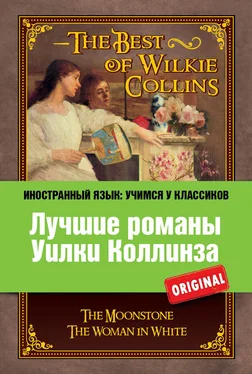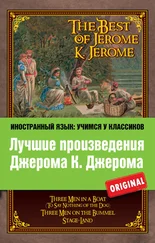The pony-chaise returned a good half hour before I had ventured to expect it. My lady had decided to remain for the present, at her sister’s house. The groom brought two letters from his mistress; one addressed to Mr. Franklin, and the other to me.
Mr. Franklin’s letter I sent to him in the library – into which refuge his driftings had now taken him for the second time. My own letter, I read in my own room. A cheque, which dropped out when I opened it, informed me (before I had mastered the contents) that Sergeant Cuff’s dismissal from the inquiry after the Moonstone was now a settled thing.
I sent to the conservatory [46]to say that I wished to speak to the Sergeant directly. He appeared, with his mind full of the gardener and the dog-rose [47], declaring that the equal of Mr. Begbie for obstinacy never had existed yet, and never would exist again. I requested him to dismiss such wretched trifling as this from our conversation, and to give his best attention to a really serious matter. Upon that he exerted himself sufficiently to notice the letter in my hand. “Ah!” he said in a weary way, “you have heard from her ladyship. Have I anything to do with it, Mr. Betteredge?”
“You shall judge for yourself, Sergeant.” I thereupon read him the letter (with my best emphasis and discretion), in the following words:
“MY GOOD GABRIEL, – I request that you will inform Sergeant Cuff, that I have performed the promise I made to him; with this result, so far as Rosanna Spearman is concerned. Miss Verinder solemnly declares, that she has never spoken a word in private to Rosanna, since that unhappy woman first entered my house. They never met, even accidentally, on the night when the Diamond was lost; and no communication of any sort whatever took place between them, from the Thursday morning when the alarm was first raised in the house, to this present Saturday afternoon, when Miss Verinder left us. After telling my daughter suddenly, and in so many words, of Rosanna Spearman’s suicide – this is what has come of it.”
Having reached that point, I looked up, and asked Sergeant Cuff what he thought of the letter, so far?
“I should only offend you if I expressed MY opinion,” answered the Sergeant. “Go on, Mr. Betteredge,” he said, with the most exasperating resignation, “go on.”
When I remembered that this man had had the audacity to complain of our gardener’s obstinacy, my tongue itched to “go on” in other words than my mistress’s. This time, however, my Christianity held firm. I proceeded steadily with her ladyship’s letter:
“Having appealed to Miss Verinder in the manner which the officer thought most desirable, I spoke to her next in the manner which I myself thought most likely to impress her. On two different occasions, before my daughter left my roof, I privately warned her that she was exposing herself to suspicion of the most unendurable and most degrading kind. I have now told her, in the plainest terms, that my apprehensions have been realised.
“Her answer to this, on her own solemn affirmation, is as plain as words can be. In the first place, she owes no money privately to any living creature. In the second place, the Diamond is not now, and never has been, in her possession, since she put it into her cabinet on Wednesday night.
“The confidence which my daughter has placed in me goes no further than this. She maintains an obstinate silence, when I ask her if she can explain the disappearance of the Diamond. She refuses, with tears, when I appeal to her to speak out for my sake. ‘The day will come when you will know why I am careless about being suspected, and why I am silent even to you. I have done much to make my mother pity me – nothing to make my mother blush for me.’ Those are my daughter’s own words.
“After what has passed between the officer and me, I think – stranger as he is – that he should be made acquainted with what Miss Verinder has said, as well as you. Read my letter to him, and then place in his hands the cheque which I enclose. In resigning all further claim on his services, I have only to say that I am convinced of his honesty and his intelligence; but I am more firmly persuaded than ever, that the circumstances, in this case, have fatally misled him.”
There the letter ended. Before presenting the cheque, I asked Sergeant Cuff if he had any remark to make.
“It’s no part of my duty, Mr. Betteredge,” he answered, “to make remarks on a case, when I have done with it.”
I tossed the cheque across the table to him. “Do you believe in THAT part of her ladyship’s letter?” I said, indignantly.
The Sergeant looked at the cheque, and lifted up his dismal eyebrows in acknowledgment of her ladyship’s liberality.
“This is such a generous estimate of the value of my time,” he said, “that I feel bound to make some return for it. I’ll bear in mind the amount in this cheque, Mr. Betteredge, when the occasion comes round for remembering it.”
“What do you mean?” I asked.
“Her ladyship has smoothed matters over for the present very cleverly,” said the Sergeant. “But THIS family scandal is of the sort that bursts up again when you least expect it. We shall have more detective-business on our hands, sir, before the Moonstone is many months older.”
If those words meant anything, and if the manner in which he spoke them meant anything – it came to this. My mistress’s letter had proved, to his mind, that Miss Rachel was hardened enough to resist the strongest appeal that could be addressed to her, and that she had deceived her own mother (good God, under what circumstances!) by a series of abominable lies. How other people, in my place, might have replied to the Sergeant, I don’t know. I answered what he said in these plain terms:
“Sergeant Cuff, I consider your last observation as an insult to my lady and her daughter!”
“Mr. Betteredge, consider it as a warning to yourself, and you will be nearer the mark.”
Hot and angry as I was, the infernal confidence with which he gave me that answer closed my lips.
I walked to the window to compose myself. The rain had given over; and, who should I see in the court-yard, but Mr. Begbie, the gardener, waiting outside to continue the dog-rose controversy with Sergeant Cuff.
“My compliments to the Sairgent,” said Mr. Begbie, the moment he set eyes on me. “If he’s minded to walk to the station, I’m agreeable to go with him.”
“What!” cries the Sergeant, behind me, “are you not convinced yet?”
“The de’il a bit I’m convinced!” answered Mr. Begbie.
“Then I’ll walk to the station!” says the Sergeant.
“Then I’ll meet you at the gate!” says Mr. Begbie.
I was angry enough, as you know – but how was any man’s anger to hold out against such an interruption as this? Sergeant Cuff noticed the change in me, and encouraged it by a word in season. “Come! come!” he said, “why not treat my view of the case as her ladyship treats it? Why not say, the circumstances have fatally misled me?”
To take anything as her ladyship took it was a privilege worth enjoying – even with the disadvantage of its having been offered to me by Sergeant Cuff. I cooled slowly down to my customary level. I regarded any other opinion of Miss Rachel, than my lady’s opinion or mine, with a lofty contempt. The only thing I could not do, was to keep off the subject of the Moonstone! My own good sense ought to have warned me, I know, to let the matter rest – but, there! the virtues which distinguish the present generation were not invented in my time. Sergeant Cuff had hit me on the raw, and, though I did look down upon him with contempt, the tender place still tingled for all that. The end of it was that I perversely led him back to the subject of her ladyship’s letter. “I am quite satisfied myself,” I said. “But never mind that! Go on, as if I was still open to conviction. You think Miss Rachel is not to be believed on her word; and you say we shall hear of the Moonstone again. Back your opinion, Sergeant,” I concluded, in an airy way. “Back your opinion.”
Читать дальше
Конец ознакомительного отрывка
Купить книгу












